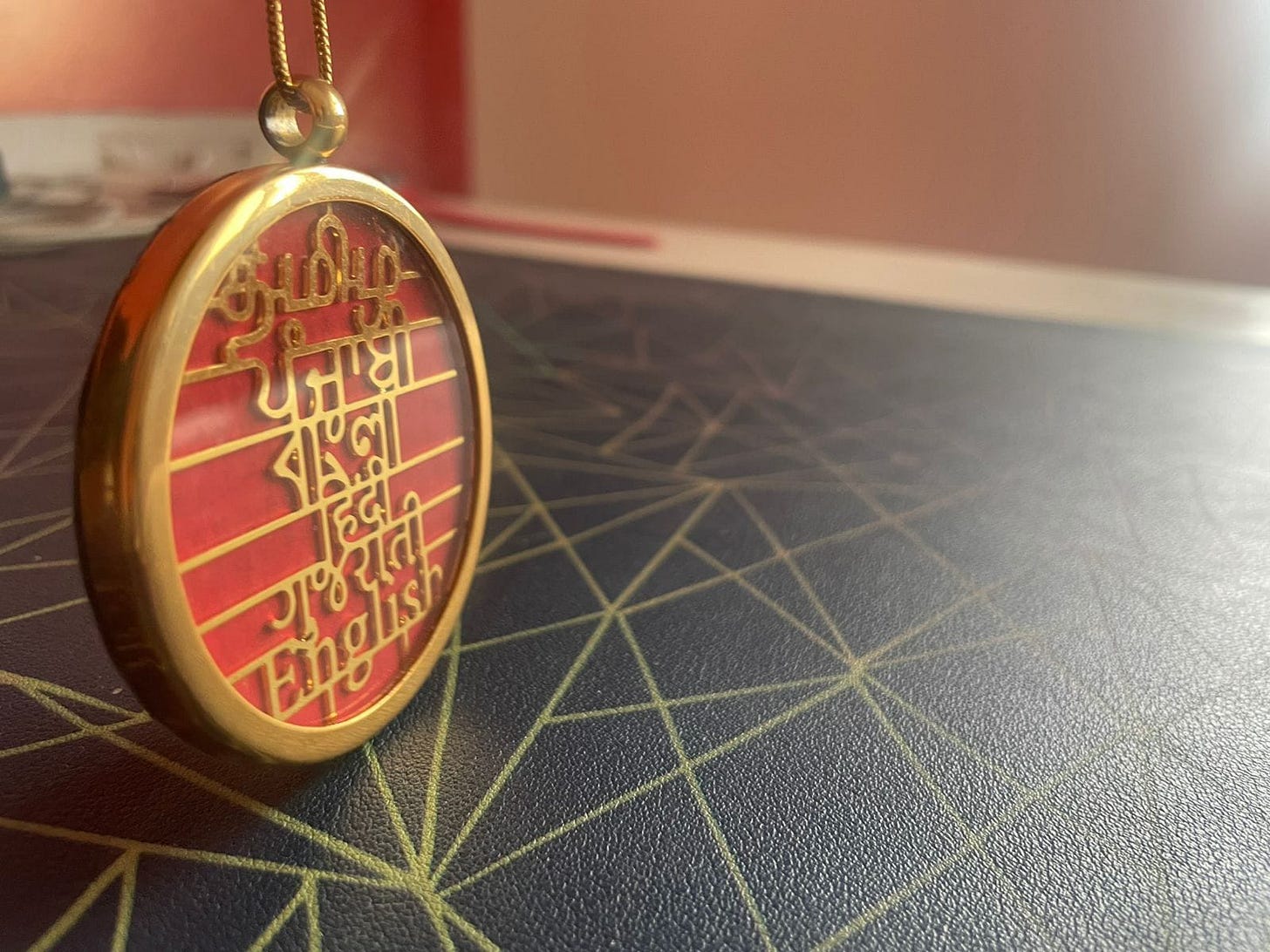This flash essay is part of a collaborative, constrained-writing challenge undertaken by some members of the Bangalore Substack Writers Group. This month, each of us examined the concept of ‘LANGUAGE’. At the bottom of this snippet, you’ll find links to other essays by fellow writers.

On my rather crowded bookshelf in Bangalore, only one shelf is reserved for works in Marathi, my mother tongue. Over time, titles such as Baluta, Shriman Yogi, and Pingalavel got hidden behind another set of books.
Growing up in Dubai, I was not in regular contact with the language, apart from speaking in broken sentences with my mother (my father and my brother continued to largely speak with me in English).
American TV shows, English music, and literature became my staples. While I also enjoyed humorous Marathi plays, slice-of-life family TV shows and films with my mother during my vacations, I believed my mother tongue was an incidental inheritance: something that would not matter much if I did not engage with it in any meaningful way.
It was only in 2019 that I was able to understand the problematic attitudes I had developed. That was the year when I heard Jerry Pinto talk about his life and times of life as a translator of Marathi and Hindi works to English, and he convinced me of the many riches that awaited me if I chose otherwise.
I decided to recommit to reading Marathi literature. It was slow and painful: While I was able to read the Devanagri script, my eyes would have to plod along each line carefully to grasp its meaning. Chapters that would take me about 15 minutes to complete in English now took me close to two hours.
Strangely enough, it was a challenge that left me wanting more. Reading Marathi was a lot more enriching because decoding each line brought me a tapestry of images rich and detailed like never before. I was also discovering new words. There were nights when I would read till 4AM, eager to know what happens next to the orphan child hero in Shyam Chi Aai or the lovers in VP Kale’s Partner, or the quirky everyday characters of PL Deshpande’s Asa Mi Asami.
I thought I would never be able to be moved by anything as strongly after what Dostoevsky or Rohinton Mistry or Proust had to offer. And yet, it was only after reading GA Kulkarni’s Raktachandan that I felt he was speaking about my family. The hues and colours of humanity portrayed by Marathi writers felt more real and meaningful than from any of the grand works of literature I ever read.
More so in my spiritual life. To me, all the volumes of Vedanta I read and the talks I heard were manifested in a much more loving, humane and profound way through the abhangs of Sant Dhyaneshwar and Sant Tukaram and sung by Pandit Bhimsen Joshi.
In short, I realized that Marathi was not just a language I had neglected, but it was also my most primordial, my most authentic lens through which I identify myself, and relate with the world.
Where do I stand today? Like a character in a 70s Bollywood film, Marathi is my long-lost mother, and slowly, but surely, I will work to reconnect with her in the end.
Thanks for reading! Do take the time to look at essay by my fellow Banagalore-based writers on the theme of language
Loss of a language By Rakhi Anil, Rakhi’s Substack
Beyond Words and Dialects by Aarti Krishnakumar, Aarti’s Substack
The language question by Rahul Singh, Mehfil
Geography & Language by Devayani Khare, Geosophy
The Dance of Languages by Haridas Jayakumar, Harry
Poetic Silence - From Anand Bhavan to 3039 and back by Amit Charles, @acnotes
No Garam Aloo in Tamil Nadu by Ayush, Ayush's Substack
Lost in translation by Vikram, Vikram’s Substack
I’ve been thinking a lot about tongues, again. by Ameya, (Always) Ameya
The Language Beneath Words by Mihir Chate, Mihir's Substack
What does this mean? by Nidhishree Venugopal, General in her Labyrinth
The Language of Murder by Gowri N Kishore | About Murder, She Wrote.
I have no words by Richa Vadini Singh, Here’s What I Think
Jal-Elephants, Thread-Navels, and Other Sanskrit Beasts by Rajat Gururaj, I came, I saw, I Floundered
Of Language, Love and Longing: Politics, Mother Tongue and Loss by Aryan Kavan Gowda, Wonderings of a Wanderer
The Bengaluru Blend by Avinash Shenoy, Off the walls
An Ode to Languages, by Lavina G, The Nexus Terrain




I have a similarly complex relationship with my mother tongue. For starters, I don't have just one. I am a Tamilian born and brought up in Kerala, thinking and reading most freely in English, and living all my adult life in Karnataka. My fluency varies wildly across these languages but after English, Malayalam comes closest.
You've written about how the works of Marathi writers was more real and meaningful to you. Funnily enough, this very realism and relatability are what make it difficult for me to read Malayalam literature. It hits too close to the bone. It hurts in a way that English, with its slight distancing, doesn't. I can be a dispassionate observer when I read in English—I simply cannot in Malayalam. Escapism, I admit. :)
How lovely is this!